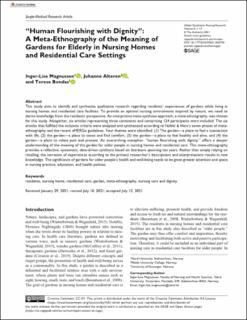| dc.contributor.author | Magnussen, Inger-Lise | |
| dc.contributor.author | Alteren, Johanne | |
| dc.contributor.author | Bondas, Terese Elisabet | |
| dc.date.accessioned | 2021-08-11T07:30:01Z | |
| dc.date.available | 2021-08-11T07:30:01Z | |
| dc.date.created | 2021-08-06T11:45:41Z | |
| dc.date.issued | 2021-07 | |
| dc.identifier.citation | Magnussen, I.L., Alteren, J., Bondas, T. (2021) ‘Human flourishing with dignity’: A meta-ethnography of the meaning of gardens for elderly in nursing homes and residential care settings. Global Qualitative Nursing Research, 8 | en_US |
| dc.identifier.issn | 2333-3936 | |
| dc.identifier.uri | https://hdl.handle.net/11250/2767281 | |
| dc.description.abstract | This study aims to identify and synthesize qualitative research regarding residents’ experiences of gardens while living in nursing homes and residential care facilities. To provide an optimal nursing environment inspired by nature, we need to derive knowledge from the residents’ perspective. An interpretive meta-synthesis approach, a meta-ethnography, was chosen for this study. Altogether, six articles representing three continents and comprising 124 participants were included. The six articles that fulfilled the inclusion criteria were analyzed and synthesized according to Noblit & Hare’s seven phases of meta-ethnography and the recent eMERGe guidelines. Four themes were identified: (1) The garden—a place to feel a connection with life, (2) the garden—a place to sense and find comfort, (3) the garden—a place to feel healthy and alive, and (4) the garden—a place to relate past and present. An overarching metaphor, “human flourishing with dignity,” offers a deeper understanding of the meaning of the garden for older people in nursing homes and residential care. This meta-ethnography provides a reflective, systematic, data-driven synthesis based on literature spanning ten years. Rather than simply relying on retelling, the narration of experiences according to the primary researcher’s descriptions and interpretations results in new knowledge. The significance of gardens for older people’s health and well-being needs to be given greater attention and space in nursing practice, education, and health policies. | en_US |
| dc.language.iso | eng | en_US |
| dc.publisher | SAGE Publishing | en_US |
| dc.rights | Navngivelse 4.0 Internasjonal | * |
| dc.rights.uri | http://creativecommons.org/licenses/by/4.0/deed.no | * |
| dc.subject | eldreomsorg | en_US |
| dc.subject | hager | en_US |
| dc.subject | sykehjem | en_US |
| dc.subject | metaetnografi | en_US |
| dc.subject | verdighet | en_US |
| dc.title | ‘Human flourishing with dignity’: A meta-ethnography of the meaning of gardens for elderly in nursing homes and residential care settings | en_US |
| dc.type | Peer reviewed | en_US |
| dc.type | Journal article | en_US |
| dc.description.version | publishedVersion | en_US |
| dc.rights.holder | © The Author(s) 2021 | en_US |
| dc.subject.nsi | VDP::Medisinske Fag: 700::Helsefag: 800::Sykepleievitenskap: 808 | en_US |
| dc.source.pagenumber | 1-17 | en_US |
| dc.source.volume | 8 | en_US |
| dc.source.journal | Global Qualitative Nursing Research | en_US |
| dc.identifier.doi | 10.1177/23333936211035743 | |
| dc.identifier.cristin | 1924358 | |
| cristin.ispublished | true | |
| cristin.fulltext | original | |
| cristin.qualitycode | 1 | |

